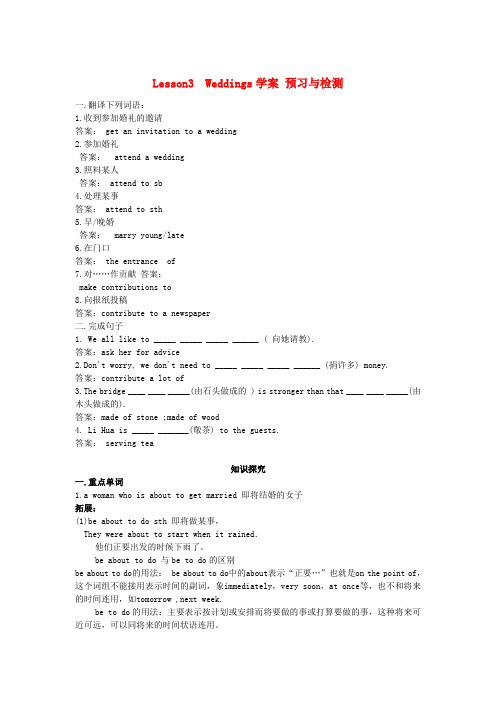北师大版高中英语必修一unit3 lesson3 Weddings
- 格式:doc
- 大小:69.50 KB
- 文档页数:6


第三单元教学设计Unit 3 Lesson 3 Weddings教材分析本课是第三单元第三课。
本单元围绕weddings这个话题,旨在通过学习印尼的婚礼的习俗及希腊婚礼的过程,激发学生的学习兴趣和热情,通过观看录像,了解教堂婚礼典礼的程序和氛围,感受婚礼的气氛。
学生通过学习有关婚礼过程的词汇,使用略读和细读等阅读策略,从文章中提取信息,处理信息,学生从中了解英语国家人们在行为举止和待人接物等方面与中国人的异同。
通过呈现婚礼上的誓言,提高学生的兴趣和对婚姻的理解。
并针对学生在学习过程中结合实际考虑自己或者朋友将来的婚礼,从而有效地帮助学生树立正确的人生观和世界观。
本课的语法是情态动词的使用。
学生在语境中学习、理解和运用情态动词。
本课计划按两课时完成:第一课时重点是阅读文章,让学生学习印尼的婚礼的习俗及希腊婚礼的过程,并掌握有关婚礼过程的词汇,使用略读和细读等阅读策略,从文章中提取信息,处理信息;第二课时复习巩固有关婚礼过程的词汇,从课文中发现、归纳情态动词的使用方式,并设计具体情景来完成语言的产入和产出的过程。
教学内容话题:印尼的婚礼的习俗及希腊婚礼的过程(阅读)词汇:重点词汇:Bride, bridegroom, best man, entrance, invitation, even if, ceremony,attend, indonesian, ought, contribute, Greek, crown, ribbon, link语法:情态动词的使用第一课时First Period教学目标在本课学习结束时,学生能够:1. 认读有关婚礼的相关词汇;2. 通过略读理解文章段落大意;3. 了解英语国家人们在行为举止和待人接物等方面与中国人的异同;4. 运用所学词汇设计自己或者朋友将来的婚礼;教学过程注: IP=Interactive Pattern; T=Teacher; Ss=Students; CW=Class Work; IW=Individual Work; PW= Pair Work; GW=Group Work第二课时Second Period教学目标在本课学习结束时,学生能够:1. 理解和使用情态动词;2. 运用情态动词给他人提建议;教学过程注: IP=Interactive Pattern; T=Teacher; Ss=Students; CW=Class Work; IW=IndividualWork; PW= Pair Work; GW=Group Work第一课时学案I.Brain-storming:1)Match the words to their definition:2)Some skills to memorize the wordsbride &bridegroombridesmaid &best man wedding ceremonywedding receptionIII. Wedding styles:IV. Reading:P art One: Weddings in Indonesiaart Two: Weddings in Greece --ActivitiesPMake a plan for your future wedding.(Use the modal verbs and new words we have learnt.) My future wedding第二课时学案Ⅰ:Advice for bridesmaids:1) Match the words to their definition:have to a) Not necessaryb) necessarydon’t havetocan c) not allowed/notpossiblecan’t d) allowed/possibleought to e) not advisableought not to f) advisableⅢCulture corner:complete the description of traditional weddings in Southern China with the modals: have to, don’t have to, can’t, canA week before the wedding, the groom’s family (1)__________ go to the bride’s house. They take presents in red boxes. Only the men (2)______ carry them –female members of the family (3)_____ carry the presents. One strange thing is that the bride’s family send them back if they don’t like them –they (4)_______ accept the presents. A few days later, females of the bride’s family (5)_________ take presents to the groom's family. On the morning of the wedding ceremony, the bride and groom (6)_________ serve tea to their parents. The ceremony is only for the family –friends (7)______ go to it. The reception is where friends can celebrate with the happy couple.。

Lesson3 Weddings学案预习与检测一.翻译下列词语:1.收到参加婚礼的邀请答案: get an invitation to a wedding2.参加婚礼答案: attend a wedding3.照料某人答案: attend to sb4.处理某事答案: attend to sth5.早/晚婚答案: marry young/late6.在门口答案: the entrance of7.对……作贡献答案:make contributions to8.向报纸投稿答案:contribute to a newspaper二.完成句子1. We all like to _____ _____ _____ ______ ( 向她请教).答案:ask her for advice2.Don't worry, we don't need to _____ _____ _____ ______ (捐许多) money.答案:contribute a lot of3.The bridge ____ ____ _____(由石头做成的 ) is stronger than that ____ ____ _____(由木头做成的).答案:made of stone ;made of wood4. Li Hua is _____ _______(敬茶) to the guests.答案: serving tea知识探究一.重点单词1.a woman who is about to get married 即将结婚的女子拓展:(1)be about to do sth 即将做某事,They were about to start when it rained.他们正要出发的时候下雨了。
be about to do 与be to do的区别be about to do的用法: be about to do中的about表示“正要…”也就是on the point of,这个词组不能接用表示时间的副词,象immediately,very soon,at once等,也不和将来的时间连用,如tomorrow ,next week.be to do的用法:主要表示按计划或安排而将要做的事或打算要做的事,这种将来可近可远,可以同将来的时间状语连用。



CelebrationWeddingsPart A Reading: WeddingsBefore you start1. Have you ever been to a wedding party? Who got married?2. Guess the meaning of the words in the Internet pages and match them to their definitions.(1) bride a) a friend of the groom who helps him during the wedding ceremony(2) bridegroom b) a party to celebrate the marriage ceremony of the two people(3) best man c) a door or gate that you go through to enter a place(4) ceremony d) a woman who is about to get married or has just got married(5) entrance e) an important social or religious occasion(6) wedding reception f) a man who is about to get married or has just got married.WeddingsWeddings in IndonesiaIf a friend gets an invitation to a wedding, you can go withhim/her, even if you don’t receive an invitation yourself.The times of the wedding ceremony and the reception are both onthe invitation. However, you ought not to go to the ceremony becauseit is only for close family. If you really want to see it, you ought toask first. Everyone can attend the reception afterwards.Nowadays, Indonesian women don’t have to cover their heads, but they unusually wear traditional clothes.There is a box at the entrance to the reception and you ought to put money into it! But don’t worry, you don’t have to contribute a lot of money.And remember- at most wedding receptions you can’t drink alcohol.Greek WeddingsOn the day of a Greek wedding ceremony, the bridegroom has to ask the bride’s father for hisdaughter’s hand in marriage. The bridegroom’s best man then goes with thecouple to the church, to be married.During the church ceremony, the best man should help put crowns made offlowers on the heads of the bride and bridegroom. A long silk ribbon that links the crowns is a symbol of a long and happy life for the couple.After the ceremony, the guests can attend a wedding reception, which is usually a huge party and can last through the night. There is a lot of eating, drinking and dancing, including the famous Greek circle dance, where everyone joins in. During the reception, guests can throw dishes on the floor and put money on the bride’s wedding dress for good luck.Read to learn3. Read the Internet pages. Are these statements true of false?(1) Indonesian families only invite people they have known for a long time.(2) The reception is before the wedding.(3) Guests usually give money as a present.(4) In Greek culture, the bridegroom has to ask for the bride’s hand in marriage.(5) The bride and bridegroom’s wedding crowns are made of gold.(6) A piece of ribbon links the wedding crowns together.Part B Grammar: have to / not have to, can / can’t, ought to / ought no to4. Underline all the following words in the texts.5. Match the verbs to their meanings.(1) have to a) not necessary(2) don’t have to b) necessary(3) can c) not allowed/not possible(4) can’t d) allowed/possible(5) ought e) not advisable(6) ought not d) to advisable★(1) have to用来表达义务、责任。
例如:You have to pass your test before you can drive.(2) don’t have to表达不必。
例如We don’t have to wear uniforms at our school.You don’t have to take me to the station. My brother’s taking me.(3) can用来表示允许或请求许可,或者表示某事可能发生。
例如:You can go out after you have done your homework.You can buy CDs at the market.(4) can’t表示禁止或者不可能。
例如:You can’t go out tonight.You can’t make bread without flour.(5) ought to表示应该做某事。
例如:You ought to visit your grandparents this weekend.(6) ought not to表示不应该做某事。
例如:You ought not to walk alone at night.6. Complete the passage below with the following words:Weddings are happy occasions but when my sister got married last year, my mum and sister did not agree on anything. First It was the dress. My mum said, ―Lisa, you _________ wear a white dress,‖ and my sister replied, ―I _________ wear white. I _________ wear pink if I like.‖ Next it was the invitations. My mum Said, ― Lisa, you really_________ invite Sally,‖ and my sister replied, ―I_________ invite her---we have too many people already.‖ Then it was the flowers. My mum said, ―you _________ have lilies. I’ve heard that they’re bad luck,‖and my sister replied, ―of course I _________ have lilies! I don’tbelieve they’re unlucky!‖ and then it was the cake!― You really _________ have a fruit cake, Lisa,‖ said my mum, but Lisa wanted chocolate. Finally, I told them that they really _________ argue so much because it makes me hate weddings for life!Part C Vocabulary: word building7. You can often make nouns from verbs by adding the suffixes ― –tion‖ and ―-ance‖. However, spellings may change somewhat. Make nouns from these verbs by competing the table.8. Use the verbs and nouns above to complete the sentences below.(1) Have you been to Ben’s party?Yes, I received an to his party today.(2) Jeremy, you didn’t class this morning.__________ is necessary if you want to pass!(3) The room has a secret .you can only if you know where it is.(4) We had a lovely wedding .We so many beautiful presents!(5) You ought to money.But your doesn’t need to be big.课后作业(一)单项填空1.John,look at the time.________you play the piano at such a late hour?A.Must B.Can C.Need D.May2.Mr Bush is on time for everything. How________it be that he was late for the opening ceremony?A.can B.should C.must D.may3.—What should I do with this passage?—________the main idea of each paragraph.A.Finding out B.Found out C.Find out D.To find out4.—Shall I go and buy more fruit for the party?—No,I have already bought 3 baskets. That________be enough.A.can B.ought to C.may D.might5.I don’t know whether my cell phone can________to the Internet or not in Hong Kong.A.connect B.link C.communicate D.combine6.—Will you go to Mary’s birthday party?—No,________invited,I can’t go to it. I’ll be too busy then.A.if B.unless C.even if D.but7.All the students in Senior Three are preparing for the national________examination now.A.entry B.entering C.entrance D.enter8.The fire spread through the hotel very quickly,so I________leave there.A.had to B.would C.could D.might9.—Will you go skiing with me this winter vacation?—It________.A.all depend B.all depends C.is all depended D.is all depending 10.The young man acted strangely during the interview. He made a bad________on the employer.A.impression B.expression C.experience D.opinion(二)完成句子11.下周你会参加她的婚礼吗?Will you________ ________ ________next week?12.她在讨论中提出了很多好的意见。